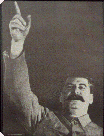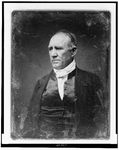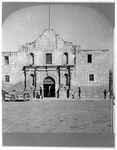Posted on March 15, 2006
Eighty-Sixing 1836
Why isn't "Houston" offensive too?
by
Daniel Clark
There must be dozens of good reasons not to name a Major League Soccer team Houston 1836. Concern that it might upset Mexicans is not among them. Nevertheless, that's the reason that was given by team president Oliver Luck. "After it was clear we'd hit a raw nerve in the community, we didn't want to offend anybody," he explained.

In the MLS's latest exercise in Eurosnobbery, the Houston franchise, which is relocating from San Jose, had named itself after the year that its new home was founded. This was done partly to mimic the German League team Munich 1860 (which was named for the founding of the team, not the city). The "raw nerve" that it hit was the one that triggers the reflexive knee-jerk of the terminally offended.
Along with the founding of Houston, the year 1836 also marks the independence of Texas from Mexico. Why this should stir any ill feelings among Mexicans who have fled Mexico to become Texans is unclear, but apparently it has done just that. Not among all of them, of course, but enough to petition Harris County Commissioner Sylvia Garcia, who relayed their concerns to the team.

Garcia herself doesn't seem to have any problem with 1836. However, she told the Houston Chronicle, "It's really not about whether one thinks the concerns about the name are legitimate or not. The fact is concerns do exist." That's precisely the attitude that the hypersensitive Left is counting on. As long as somebody says he's offended, he does not need to have a valid point.
Owner Philip Anschutz promptly acquiesced, and changed the name of his team to the Houston Dynamo. If that nickname sounds familiar, that's because it was the name assigned to the soccer and hockey teams founded by secret police departments in Soviet-bloc countries (e.g., Dynamo Moscow, Dynamo Berlin, etc). Had Anschutz deliberately set out to find an offensive name for his team, he couldn't have done much better if he'd named it the Houston Gestapo.
One of the Dynamo's opponents in the MLS will be a team called the New England Revolution, which has existed since 1995, but has drawn notably few protests from English hooligans. But then, if the Brits took offense as easily as everyone else did, they would have launched an anti-defamation campaign against Mike Myers years ago. They've obviously got a lot to learn about multiculturalism.
The man who can probably take the most credit (or blame) for dumping the 1836 moniker is a history professor named Raul A. Ramos. In an op-ed piece he wrote for the Chronicle, Ramos not only suggested changing the name, but also complained that, "The team logo compounds the connection [to the secession from Mexico] by depicting Sam Houston on horseback, leading the charge against Mexican troops."

The punchline to this silliness is that Ramos teaches at the University of Houston. So an image of Sam Houston is intolerable, but living in a place named after him isn't? The city of Houston was christened just months after his victory over Santa Anna. If the use of the year 1836 is forbidden because it is connected to Mexico's defeat, then what about one of the largest cities in America serving as a tribute to the man who defeated it?
But then, why stop at Houston? In San Antonio, there's an indoor stadium called the Alamodome, which hosts an annual college football game called the Alamo Bowl.
Use of the word "Alamo" has got to be considered more offensive than the number 1836. Not only were hundreds of Mexicans killed at the Alamo, but Sam Houston's army famously used the battle cry, "Remember the Alamo" in the decisive battle at San Jacinto. Mention of the Alamo immediately calls to mind the Texans' fight for independence. By comparison, if you say "1836" to someone, he's not likely to know offhand what event you're referring to. If the Houston soccer team had stuck with that name, announcers would have had to explain it during every televised match.

Not only does the city of San Antonio not discourage references to the Alamo, but it has inseparably identified itself with that historical site. The state of Texas has even turned the Alamo into one of the most popular tourist attractions in America. How hurtful.
It logically follows that the very existence of a non-Mexican Texas is an affront to those whose racial identity politics led them to protest Houston 1836. Anyone carrying a 170 year-old grudge over San Jacinto is bound to be offended by the sight of all things Texan, right down to the Lone Star on the state flag. This would seem to preclude such people from even living in Texas in the first place, since it's a documentable fact that they have more Texan stuff there than anyplace else in the world.

By treating a statement of pride in the state's origin as if it were tantamount to an obscenity, the Dynamo has surely angered and alienated more people than it had in the original "controversy." Not that it makes any difference. Once somebody who's been threatened with accusations of bigotry has yielded to those threats, any deference he shows to the majority will only appear to support the charges. So once Mr. Anschutz reacted to complaints from people like Professor Ramos, there was no turning back. The result is the kind of absurdity that political correctness is designed to produce: a soccer team based in Houston, Texas, that is ashamed to associate itself with the founding of Houston, or the history of Texas.
Now that the academic p.c. police have gotten one MLS franchise to bow to their demands, just wait until they realize that the league has another team called the Columbus Crew -- a clear reference to the shipmates of history's most infamous, genocidal Earth-rapist. Perhaps the owner of the Crew can head off that future confrontation by giving in now, and renaming his team something like KGB Ohio. You'd be hard-pressed to find any college professor in America who would have a problem with that.
-- Daniel Clark is a Staff Writer for the New Media Alliance. The New Media Alliance is a non-profit (501c3) national coalition of writers, journalists and grass-roots media outlets.
The Shinbone: The Frontier of the Free Press
Mailbag . Issue Index . Politimals